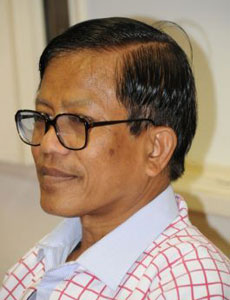Chiang Mai (Mizzima) – The Overseas Mon Coordinating Committee (OMCC) has urged the New Mon State Party (NMSP) not to engage the Burmese government in peace talks without members of the United Nationalities Federal Council (UNFC) taking part.

“The Mon State government is dominated by the Union Solidarity and Development Party (USDP) and to hold these meeting with the NMSP divides ethnic forces and it is just a part of successive governments’ policies to divide ethnic people,” said an OMCC statement.
“We would like to strongly urge the NMSP not to accept the USDP-dominated Mon State government’s offer to hold peace talk,” the statement said.
The OMCC pointed out that while the Mon State government is planning to meet with the NMSP, the central government has launched military offensives against the Kachin Independence Organization, the Shan State Army-South, the Karen National Union (KNU) and other ethnic armed groups.
Nai Thiri Mon Chan, an OMCC spokesperson, told Mizzima, “If the government really wants to stop the civil war, it must set policies to seek peace and national reconciliation and must hold an all-inclusive dialogue to achieve a nationwide a cease-fire.”
The OMCC statement noted that in the past the former junta sought cease-fire agreements with ethnic armed groups separately and divided the groups by giving different opportunities to different groups, causing divisions.
Nai Han Thar, the general-secretary of the NMSP and the UNFC, told Mizzima: “The Mon State government has not officially offered [peace talks]. If it offers, we will welcome it. We will discuss it as an initial step. But, regarding a cease-fire and politics, we will only discuss [with the government] as a whole group [the UNFC].”
The Mon State government formed a delegation led by Mon State Energy and Electric Power Minister Nai Lawi Aung, aka Nai Myint Swe, in September, according to a person who is close to the delegates.
In late September, a delegation led by Colonel Aung Lwin, the Karen State Minister for security and border affairs, met with the KNU, a member-group of the UNFC, on the Thai-Burmese border to offer to hold peace talks. The KNU replied that it wanted discussions with the central government, not with the Karen State government, according to KNU sources.
The UNFC was formed on February 17 to work to establish a genuine federal union. It comprises both ethnic cease-fire groups and non-ceasefire groups. There are six dedicated member groups and six associate member groups. The group’s aim to cooperate in resisting the government’s political pressure for individual cease-fires and its military offensives.
In late August, the Kachin Independence Organizaiton spokesman, La Nang, said the government is afraid of nationwide cease-fire talks because it might lead to local or foreign pro-democracy groups entering the discussions, creating “tri-party” talks.
“The authorities do not want to lose absolute power. So to prevent that, it does not want to agree to a cease-fire with ethnic armed groups,” La Nang told Mizzima. “All ethnic people living in the hill lands are losing their rights. The government does not want ethnic groups to form a political alliance to conduct a dialogue. The government’s afraid it would suffer and have to give up something in such a dialogue.
“The government wants only regional-level negotiations. Although we have demanded a nationwide cease-fire and a political dialogue, the government doesn’t want to negotiate on that.”
Because of the government’s unwillingness to hold a political dialogue, the civil war might spread more widely, he said.
The KIO has said that it cannot accept the central government’s offer to conduct negotiations with the Kachin State government. The Kachin have been fighting for more political autonomy and human rights, he said, and the state government does not have the power to solve those issues.


